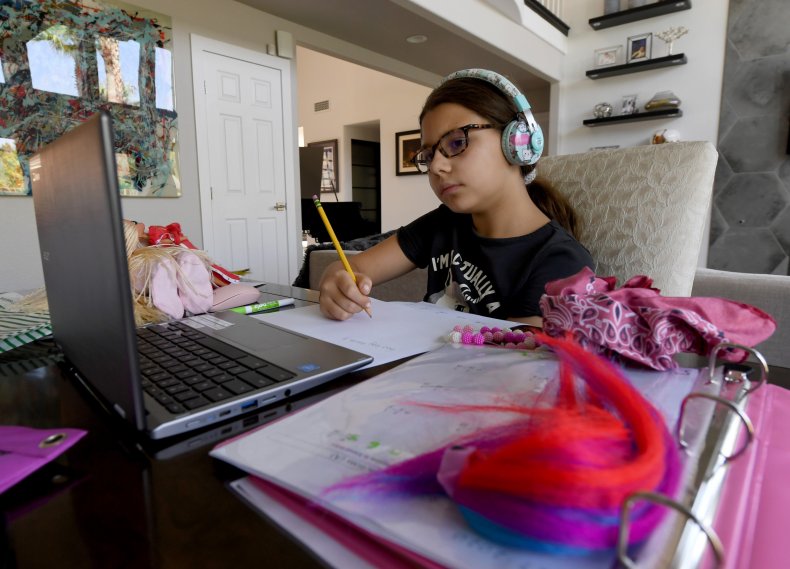The president of the National Parents Union, a network of parent organizations, says the school closures and the return to virtual class is an "abomination."
"Once again, parents are left scrambling at the last minute and, worse, far too many children are being deprived of an in-person learning experience, which is critical for their academic and social-emotional development," Keri Rodrigues said in a statement posted to the union's Twitter account.
Some school systems extended their holiday break Monday or went back to virtual learning due to a surge in COVID cases. Rodrigues said in the statement this "could have and should have been avoided."
"Districts have had two years to adequately plan for this and more than $120 billion in federal funding has flowed into schools," Rodrigues said in the statement. "Yet, schools are closing on a whim and parents are being left in the dark about how that money is being spent. There is no substitute for in-person learning and there is no excuse for the lack of leadership that is plaguing communities today."
The Los Angeles Unified School District announced Monday they would postpone their reopening until Jan. 11 due to the Omicron surge. Students and employees have to have a negative COVID test to enter campuses. The district will have take-home kits, as well as a testing site.
The Milwaukee School System and the Madison, Wisconsin, District will return to virtual instruction starting Tuesday and Thursday, respectively. The Milwaukee school system said it hopes to go back to in-person classes on Jan. 10.
Detroit School Superintendent Nikolai Vitti informed parents schools will be closed through Wednesday due to a high rate of infection among employees that could result in a substantial spread of COVID and "excessive staff shortages."
Schools in Davenport, Iowa canceled classes Monday due to a bus driver shortage partly due to COVID, while schools in Peoria, Illinois added a week to their winter break.

Caught between pleas from teachers fearful of infection and parents who want their children in class, school districts in cities such as New York, Milwaukee, Chicago, Detroit and beyond found themselves in a difficult position midway through the academic year because of the super-contagious omicron variant.
New York City, home of the nation's largest school system, reopened classrooms to roughly 1 million students with a stockpile of take-home COVID-19 test kits and plans to double the number of random tests done in schools.
"We are going to be safe, and we will be open to educate our children," newly sworn-in Mayor Eric Adams said on MSNBC.
While the teachers union had asked the mayor to postpone in-person learning for a week, city officials have long said that mask requirements, testing and other safety measures mean that children are safe in school. The city also has a vaccination mandate for employees.
New cases of COVID-19 in the city shot up from a daily average of about 17,000 in the week before the holidays to nearly 37,000 last week.
Across the U.S., new COVID-19 cases have tripled in the past two weeks to over 400,000 a day, the highest level on record, amid a rush by many Americans to get tested.
The high infection rates and resulting worker shortages are putting a heavy burden on employers large and small. Thousands of airline flights have been canceled in recent days, and many businesses have shelved return-to-work plans.
Weekend garbage collection was delayed in New Orleans, and jury trials in several Colorado counties were suspended. Some libraries on New York's Long Island and a ski resort in New Hampshire had to close.
Dawn Crawley, CEO of House Cleaning Heroes, a cleaning service based in Herndon, Virginia, said she had to cancel four of 20 cleaning jobs for Tuesday because four employees were sick — three with COVID-19.
"The fear is it will run through the team" as well as customers, she said.
Policymakers and health authorities have been mindful of the toll on the economy and the education system.
Public heath experts have said that eradicating the virus is unlikely and that the world will instead have to find a way to keep COVID-19 down to an acceptable level, the way it does with the flu.
Last week, after the Centers for Disease Control and Prevention cut the recommended COVID-19 isolation period from 10 days to five, CDC Director Dr. Rochelle Walensky said: "We want to make sure there is a mechanism by which we can safely continue to keep society functioning while following the science."
In another development Monday that could have a bearing on the ability of schools to stay open, the Food and Drug Administration gave its OK for Pfizer booster shots for children as young as 12. Boosters already are recommended for everyone 16 and older.
The roughly 350,000 students in the Chicago school system returned, but a dispute between district leaders and the teachers union over safety measures could disrupt classes later this week. The union said it may vote Tuesday for remote teaching in the nation's third-largest district.
The Associated Press contributed to this report.

Post a Comment